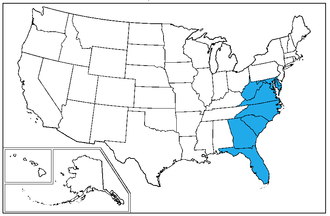South Atlantic states
 From Wikipedia - Reading time: 10 min
From Wikipedia - Reading time: 10 min
This article is missing information about total population of this Census Division from the 2010 Census. (October 2021) |

The South Atlantic states form one of the nine Census Bureau Divisions within the United States that are recognized by the United States Census Bureau. This region, U.S. Census Bureau Region 3, Division 5, corresponds to the South (states/areas that were geographically part of the Thirteen Colonies) with the addition of Florida.
Terminology
[edit]The name of the census division does not refer to the South Atlantic Ocean, but rather to its location along the Atlantic Coast of the United States. Farther north are the Census-defined Middle Atlantic and New England (or North Atlantic) states.
Geography
[edit]This division includes eight states and one district; Delaware, Florida, Georgia, Maryland, North Carolina, South Carolina, Virginia, West Virginia and Washington.[1] This division is also a recognized geographical division used by the United States Geological Survey.[2]: 2 All entities within the region apart from the District of Columbia and West Virginia border the North Atlantic Ocean.
Together with the East South Central States (Alabama, Kentucky, Mississippi and Tennessee) and the West South Central states (Arkansas, Louisiana, Oklahoma and Texas), the South Atlantic states constitute the United States Census Bureau's broader Census Bureau Region of the South (the other three regions being the Northeast, Midwest and West, all of which have two divisions).
Demographics
[edit]
As of 2010, the South Atlantic states had a combined population of 61,774,970. The South Atlantic states region covers 292,589 square miles (757,800 km2). With the exception of West Virginia, the region has seen rapid population growth and economic development in recent decades.
| State | 2020 census | Land area |
|---|---|---|
| Delaware | 989,948 | 1,982 |
| Florida | 21,538,187 | 65,755 |
| Georgia | 10,711,908 | 59,425 |
| Maryland | 6,177,224 | 12,407 |
| North Carolina | 10,439,388 | 53,819 |
| South Carolina | 5,118,435 | 32,020 |
| Virginia | 8,631,393 | 42,774 |
| West Virginia | 1,793,716 | 24,230 |
| Washington, D.C. | 689,545 | 177 |
| City | 2020 census | |
|---|---|---|
| 1 | Jacksonville, Florida | 949,611 |
| 2 | Charlotte, North Carolina | 874,579 |
| 3 | Washington, D.C. | 689,545 |
| 4 | Baltimore, Maryland | 585,708 |
| 5 | Atlanta, Georgia | 498,715 |
| 6 | Raleigh, North Carolina | 467,665 |
| 7 | Virginia Beach, Virginia | 459,470 |
| 8 | Miami, Florida | 442,241 |
| 9 | Tampa, Florida | 384,959 |
| 10 | Orlando, Florida | 307,573 |
| Metro area | 2020 census | |
|---|---|---|
| 1 | Washington-Arlington-Alexandria, DC-VA-MD-WV MSA | 6,385,162 |
| 2 | Atlanta-Sandy Springs-Alpharetta, GA MSA | 6,220,106 |
| 3 | Miami-Fort Lauderdale-West Palm Beach, FL MSA | 6,138,333 |
| 4 | Tampa-St. Petersburg-Clearwater, FL MSA | 3,175,275 |
| 5 | Baltimore-Columbia-Towson, MD MSA | 2,844,510 |
| 6 | Orlando-Kissimmee-Sanford, FL MSA | 2,673,376 |
| 7 | Charlotte-Concord-Gastonia, NC-SC MSA | 2,660,329 |
| 8 | Virginia Beach-Norfolk-Newport News, VA-NC MSA | 1,799,674 |
| 9 | Jacksonville, FL MSA | 1,605,848 |
| 10 | Raleigh-Cary, NC MSA | 1,413,982 |
Politics
[edit]| Parties | ||||||||
| Nonpartisan | Democratic-Republican | Democratic | Nullifier | Whig | Republican | Liberal Republican | Dixiecrat | American Independent |
- Bold denotes election winner.
- Note: Election results for the Upper South Atlantic States (Delaware, Maryland, Virginia, West Virginia and Washington, D.C.) are included in the table of the Mid-Atlantic states article.
References
[edit]- ^ "Census Regions and Divisions of the United States" Archived 2013-01-07 at the Library of Congress Web Archives, U.S. Census Bureau, retrieved June 19, 2011
- ^ "Circular - Google Books". 2010-01-15. Retrieved 2016-10-04.
 KSF
KSF